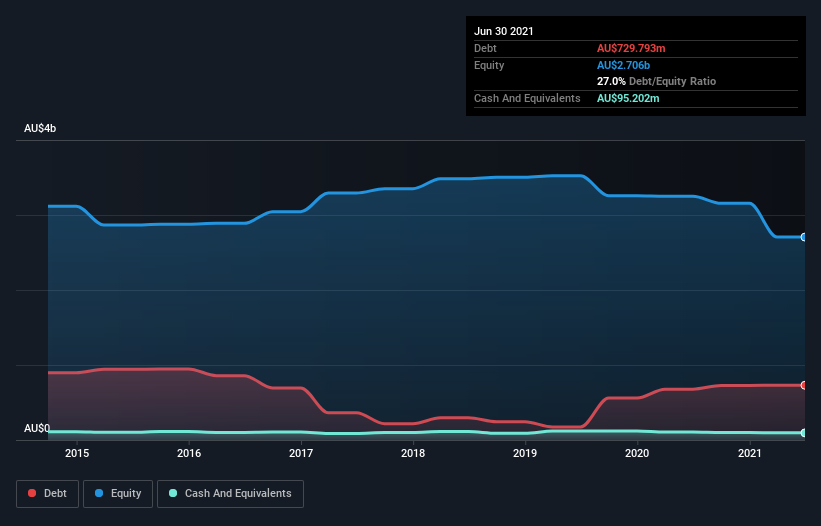
The external fund manager backed by Berkshire Hathaway's Charlie Munger, Li Lu, makes no bones about it when he says 'The biggest investment risk is not the volatility of prices, but whether you will suffer a permanent loss of capital.' So it might be obvious that you need to consider debt, when you think about how risky any given stock is, because too much debt can sink a company. As with many other companies Whitehaven Coal Limited (ASX:WHC) makes use of debt. But is this debt a concern to shareholders?
Why Does Debt Bring Risk?
Generally speaking, debt only becomes a real problem when a company can't easily pay it off, either by raising capital or with its own cash flow. Part and parcel of capitalism is the process of 'creative destruction' where failed businesses are mercilessly liquidated by their bankers. However, a more usual (but still expensive) situation is where a company must dilute shareholders at a cheap share price simply to get debt under control. Of course, the upside of debt is that it often represents cheap capital, especially when it replaces dilution in a company with the ability to reinvest at high rates of return. The first step when considering a company's debt levels is to consider its cash and debt together.
View our latest analysis for Whitehaven Coal
What Is Whitehaven Coal's Net Debt?
The image below, which you can click on for greater detail, shows that at June 2021 Whitehaven Coal had debt of AU$729.8m, up from AU$678.0m in one year. However, because it has a cash reserve of AU$95.2m, its net debt is less, at about AU$634.6m.

How Strong Is Whitehaven Coal's Balance Sheet?
We can see from the most recent balance sheet that Whitehaven Coal had liabilities of AU$360.2m falling due within a year, and liabilities of AU$1.33b due beyond that. Offsetting these obligations, it had cash of AU$95.2m as well as receivables valued at AU$154.2m due within 12 months. So it has liabilities totalling AU$1.44b more than its cash and near-term receivables, combined.
Whitehaven Coal has a market capitalization of AU$3.27b, so it could very likely raise cash to ameliorate its balance sheet, if the need arose. But it's clear that we should definitely closely examine whether it can manage its debt without dilution. When analysing debt levels, the balance sheet is the obvious place to start. But it is future earnings, more than anything, that will determine Whitehaven Coal's ability to maintain a healthy balance sheet going forward. So if you want to see what the professionals think, you might find this free report on analyst profit forecasts to be interesting.
Over 12 months, Whitehaven Coal made a loss at the EBIT level, and saw its revenue drop to AU$1.6b, which is a fall of 9.4%. We would much prefer see growth.
Caveat Emptor
Over the last twelve months Whitehaven Coal produced an earnings before interest and tax (EBIT) loss. Indeed, it lost AU$55m at the EBIT level. When we look at that and recall the liabilities on its balance sheet, relative to cash, it seems unwise to us for the company to have any debt. Quite frankly we think the balance sheet is far from match-fit, although it could be improved with time. For example, we would not want to see a repeat of last year's loss of AU$544m. So we do think this stock is quite risky. When analysing debt levels, the balance sheet is the obvious place to start. But ultimately, every company can contain risks that exist outside of the balance sheet. These risks can be hard to spot. Every company has them, and we've spotted 2 warning signs for Whitehaven Coal you should know about.
If, after all that, you're more interested in a fast growing company with a rock-solid balance sheet, then check out our list of net cash growth stocks without delay.
If you're looking to trade Whitehaven Coal, open an account with the lowest-cost platform trusted by professionals, Interactive Brokers.
With clients in over 200 countries and territories, and access to 160 markets, IBKR lets you trade stocks, options, futures, forex, bonds and funds from a single integrated account.
Enjoy no hidden fees, no account minimums, and FX conversion rates as low as 0.03%, far better than what most brokers offer.
Sponsored ContentValuation is complex, but we're here to simplify it.
Discover if Whitehaven Coal might be undervalued or overvalued with our detailed analysis, featuring fair value estimates, potential risks, dividends, insider trades, and its financial condition.
Access Free AnalysisThis article by Simply Wall St is general in nature. We provide commentary based on historical data and analyst forecasts only using an unbiased methodology and our articles are not intended to be financial advice. It does not constitute a recommendation to buy or sell any stock, and does not take account of your objectives, or your financial situation. We aim to bring you long-term focused analysis driven by fundamental data. Note that our analysis may not factor in the latest price-sensitive company announcements or qualitative material. Simply Wall St has no position in any stocks mentioned.
Have feedback on this article? Concerned about the content? Get in touch with us directly. Alternatively, email editorial-team (at) simplywallst.com.
About ASX:WHC
Whitehaven Coal
Develops and operates coal mines in New South Wales and Queensland.
Moderate growth potential with mediocre balance sheet.
Similar Companies
Market Insights
Community Narratives



